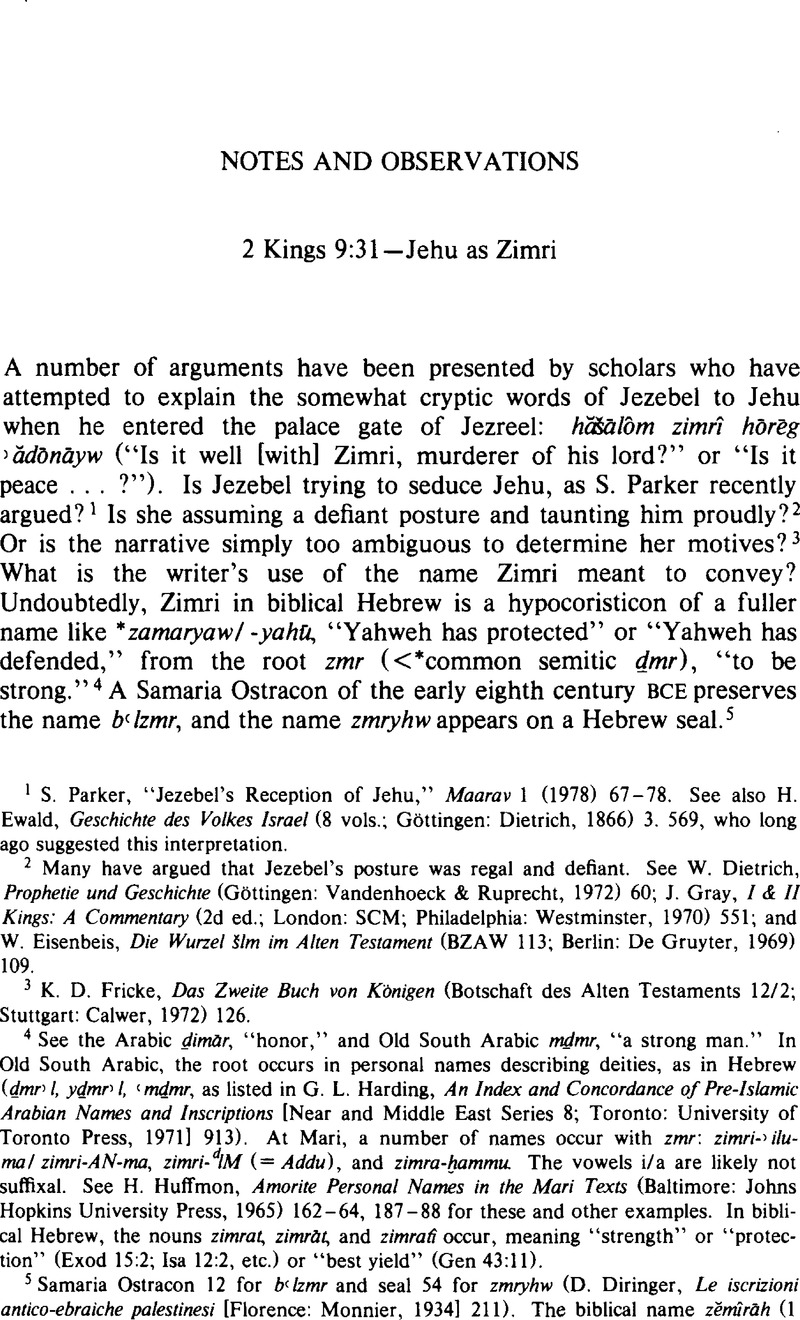No CrossRef data available.
Published online by Cambridge University Press: 10 June 2011

1 Parker, S., “Jezebel's Reception of Jehu,” Maarav 1 (1978) 67–78.Google Scholar See also Ewald, H., Geschichte des Volkes Israel (8 vols.; Göttingen: Dietrich, 1866) 3.Google Scholar 569, who long ago suggested this interpretation.
2 Many have argued that Jezebel's posture was regal and defiant. See Dietrich, W., Prophetie und Geschichte (Göttingen: Vandenhoeck & Ruprecht, 1972) 60CrossRefGoogle Scholar; Gray, J., I & II Kings: A Commentary (2d ed.; London: SCM; Philadelphia: Westminster, 1970) 551Google Scholar; and Eisenbeis, W., Die Wurzel šlm im Alten Testament (BZAW 113; Berlin: De Gruyter, 1969) 109.Google Scholar
3 Fricke, K. D., Das Zweite Buch von Königen (Botschaft des Alten Testaments 12/2; Stuttgart: Calwer, 1972) 126.Google Scholar
4 See the Arabic ḏimār, “honor,” and Old South Arabic mḏmr, “a strong man.” In Old South Arabic, the root occurs in personal names describing deities, as in Hebrew (ḏmr ʾ l, yḏmrʾ l, ʿ mḏmr, as listed in Harding, G. L., An Index and Concordance of Pre-Islamic Arabian Names and Inscriptions [Near and Middle East Series 8; Toronto: University of Toronto Press, 1971] 913).Google Scholar At Mari, a number of names occur with zmr: zimri-ʾ iluma l zimri-AN-ma, zimri-dIM (= Addu), and zimra-ḫammu. The vowels i/a are likely not sufflxal. See Huffmon, H., Amorite Personal Names in the Mari Texts (Baltimore: Johns Hopkins University Press, 1965) 162–64, 187–88Google Scholar for these and other examples. In biblical Hebrew, the nouns zimrat, zimra᷎t, and zimrati occur, meaning “strength” or “protection” (Exod 15:2; Isa 12:2, etc.) or “best yield” (Gen 43:11).
5 Samaria Ostracon 12 for bʿlzmr and seal 54 for zmryhw (Diringer, D., Le iscrizioni antico-ebrakhe palestinesi [Florence: Monnier, 1934] 211).Google Scholar The biblical name zĕmîrāh Chr 7:8) is perhaps best corrected to *zĕmaryāh or zemaryāh on the basis of LXXAL (Zamarias). A metathesis of r and y seems to have occurred at some time in the process of textual transmission.
6 Against Parker, “Jezebel's Reception,” 71–72.
7 See Gray, I & II Kings, 64, 75 for discussion of the chronology of Israel's kings in this period.
8 Parker, “Jezebel's Reception,” 67–78.
9 Here I develop an observation made in my article “Hăšālôm: Some Literary Considerations of 2 Kings 9,” CBQ 46 (1984) 652–68.Google Scholar
10 See Cross, F. M., Canaanite Myth and Hebrew Epic (Cambridge: Harvard University Press, 1973) 219–37Google Scholar, on conditional kingship in Israel. The term “charismatic kingship,” which goes back to Albrecht Alt and is used by many current scholars, is less desirable. See Alt, Albrecht, “The Formation of the Israelite State in Palestine,” in idem, Essays on Old Testament History and Religion (trans. R., Wilson; New York: Doubleday, 1968) 173–237.Google Scholar The title na᷎gīd appears in connection with conditional kingship, as Cross has observed. It is used of Saul (1 Sam 9:16; 10:1), Jeroboam (1 Kgs 11:34), and Baasha (1 Kgs 16:2). It is an old military title, probably to be translated “commander.” At times it is used of government officials (or officers in the government) in inscriptional materials (Adon Letter 8, Sefire 3.10). In 1 Chr 12:28, it is used of Jehoiada, leader of the Aaronids. See the comprehensive and insightful treatment by Halpern, B., “The na᷎gîd in Monarchic Israel,” in idem, The Constitution of the Monarchy in Israel (HSM 25; Chico, CA: Scholars Press, 1981) 1–11.Google Scholar
11 2 Kgs 9:30. See Parker, “Jezebel's Reception,” 70. Here he argues that Jezebel's acts of preparation, and not her words, are the key for interpreting the passage.
12 Ibid., 71–72.
13 Ibid.
14 See Lawton, R. B., “Israelite Personal Names on Hebrew Inscriptions Antedating 500 BCE” (Ph.D. diss., Harvard University, 1977) 54Google Scholar on bʿlzmr of Samaria Ostracon 12.
15 Parker asserts that a common noun cognate to zimrāh is preserved in Jezebel's speech (1) with -î added secondarily or (2) with original -î comparable to such words as ḥopsî or ʾakza᷎rî. The -î termination is certainly not secondary. As I have argued, it is hypocoristic, an ending commonly placed on shortened forms of names. Compare šimʿî, šimrî, šĕlo᷎mî, ʿezrî, tibnî, and ʿ;omrî This hypocoristic ending should be compared to -ay, ōhl -ōn, -āh, and -āʾ Since this is such a common short-name formation, it seems quite unlikely that zimrî is a common noun.
16 See the references listed in n. 2 above.
17 Jer 4:30; Ezek 23:40–45, esp. 40; Prov 6:24–26. See Parker, “Jezebel's Reception,” 68.
18 As others have pointed out. See Gray, I & II Kings, 550.
19 Parker, “Jezebel's Reception,” 70.
20 See the cognate nouns zānûr, “pruning a vineyard,” in Ct 2:12 and the Gezer Calendar (KAI182; yrḥw zmr, “months of pruning”), zĕmōrāh, “shoot,” in Num 13:23, etc., and *mazme᷎rāh (only pl.), “pruning knife,” in Isa 18:5, etc.
21 In 1 Kgs 21:3, Naboth refers to his vineyard (kèrem) as naḥălat ʾ ăbōtāi, “the inheritance of my fathers.” In 2 Kings 9, ḥelqa᷎h (“portion”) is used consistently to refer to the property of Naboth. I believe that the (ḥelqăh of 2 Kings 9 and the nahălāh of 1 Kings 21 are one and the same, not separate entities. The use of these different terms (plus kérem) to describe the property of Naboth is the result of oral transmission of the story, comparable to the other variants in the story when one compares 1 Kings 21 and 2 Kings 9. (Did Naboth alone die or was it Naboth and his sons? Did Jezebel play a role in Naboth's death or did she not?) See recently Bohlen, R., Der Fall Naboth (Trierer Theologische Studien 35; Trier: Paulinus, 1978) 279–301 and 320–49.Google Scholar
22 See 2 Kgs 9:26 for the old oracle against Ahab, where the blood of Naboth and his sons is the issue, in contrast to the deuteronomistic oracle in vss 7–10a, where the blood of the prophets is focal. For a discussion of the oracles in 2 Kings 9, see Olyan, “Hăšālôm,” 654–59.